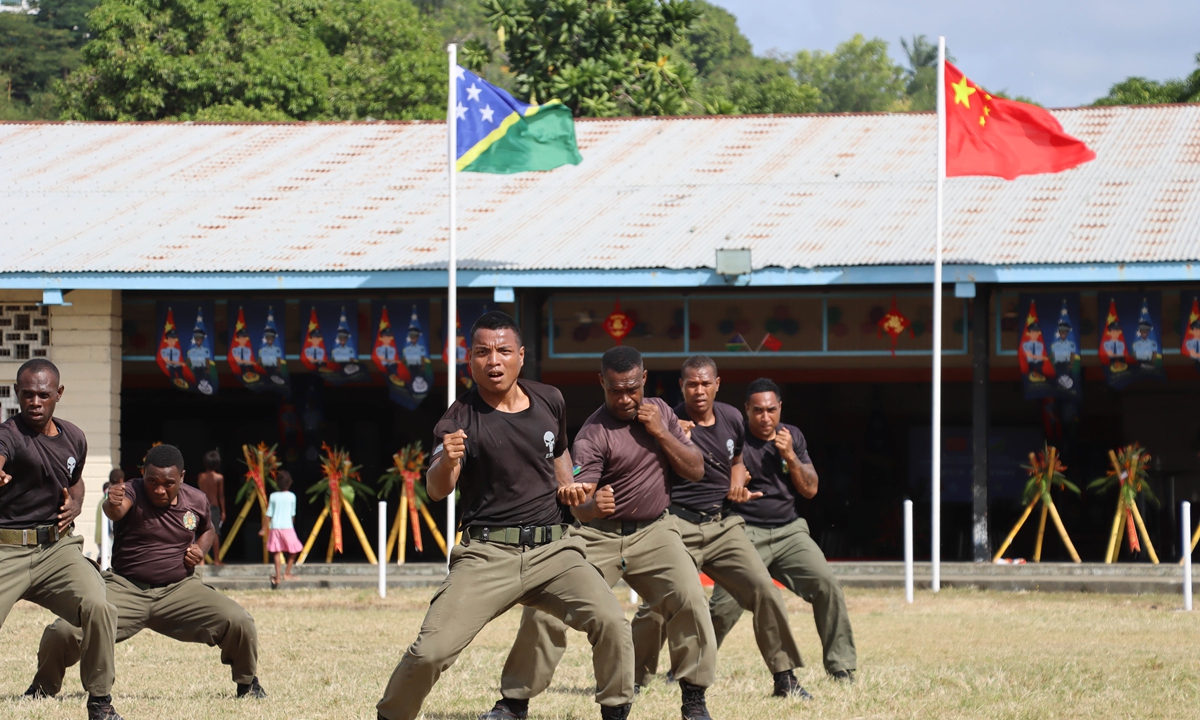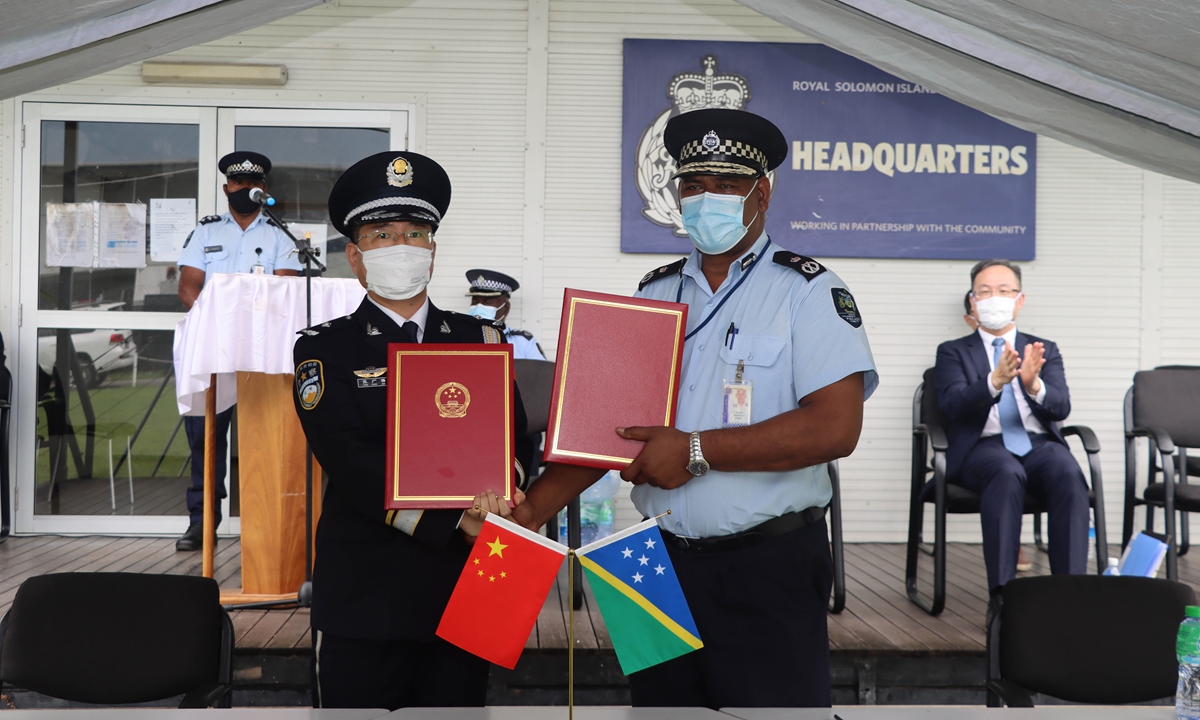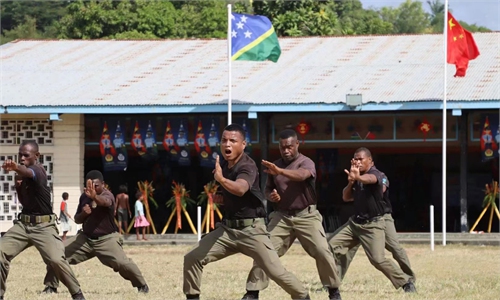IN-DEPTH / IN-DEPTH
Exclusive: China-Solomon Islands police training enhances friendship, law-enforcement capacity after Chinatown losses
The joint fight

A demonstration of the joint police training between China and the Solomon Islands on July 1, 2022. Photo: Courtesy of China Police Liaison Team
A public demonstration performance consisting the feature of Chinese police tactics and techniques was held earlier this month in the Solomon Islands, which showcased the achievements of China-Solomon Islands cooperation on policing and security.
Recently, Police Commissioner Third Class Zhang Guangbao, who is leader of the China Police Liaison Team to the Solomon Islands, shared many details of the training and the hard work that went into the demonstration by Chinese and Solomon Islands' police, during an exclusive interview with the Global Times.
"The police cooperation between China and the Solomon Islands is not a threat to regional security and stability, but has effectively promoted these elements," Zhang said, noting that as for some countries "feeling threatened," it is because they "do not want to see China's influence in the South Pacific region."
"I feel safer," the Solomon Islands' Prime Minister Manasseh Sogavare said after watching the demonstration, which was also attended by Chinese Ambassador to the Solomon Islands Li Ming.
Now, more than 180 police officers from Royal Solomon Islands Police Force (RSIPF) and the Correctional Service of Solomon Islands (CSSI) have completed their training with the Chinese police. Their capability to maintain social stability, as well as their confidence and morale, has been boosted. Trust and understanding between the two countries have also increased through the process.
Taking on responsibility
"Shocked, sad, and furious." They were the sentiments expressed by Zhang after he and his teammates saw the ruins in Chinatown of Honiara, capital of Solomon Islands.
Chinatown was not only the first stop of the China Police Liaison Team when they arrived in the Solomon Islands on January 26, but also a reason for them to be in the country.
From November 24 to 26, 2021, serious social riots occurred in the Solomon Islands. Chinatown in Honiara was vandalized and looted, and hundreds of overseas Chinese nationals there became homeless. Their assets from decades of hard work instantly went up in smoke.
In total, the riots caused losses worth $150 million and made more than 1,000 people jobless. The post-disaster reconstruction was under great strain, which also caused serious trauma to the economic and social development of Solomon Islands.
The riots were not dealt with effectively, exposing the weaknesses of the police force and a lack of equipment and training in the island nation with a population of around 0.72 million. Under such circumstances and upon request by the Solomon Islands' government, the Chinese government quickly dispatched a liaison team to Honiara to support capacity building within the police force in maintaining social safety and stability.
In December 2021, and January and February 2022, along with COVID-19 prevention supplies, China also sent police equipment and supplies to the Solomon Islands, according to the Chinese Embassy.
The Solomon Islands government's invitation of the Chinese police to the country shows their trust in China. Since the establishment of diplomatic relations in 2019, the islanders have witnessed China's support and assistance to the country, believing that China will sincerely help them, Zhang said.

Chinese police hand over equipment to Solomon Islands police Photo: Courtesy of China Police Liaison Team
Combining martial arts and grappling
The five-month joint training, which kicked off on March 14, saw not only the police officers resolving to make great efforts to beat challenges and improve their capabilities, but also trust and friendship growing between the two sides.
The China Police Liaison Team consists of nine officers from the Ministry of Public Security, People's Public Security University of China, and the Beijing Municipal Public Security Bureau, who are experts in police training, public order management, police liaison, and communication technology, Zhang said.
The main task is to help the local police to strengthen capacities in public management, response to riots, the maintenance of social stability, law, order, and security, and the protection of life and property for all residents in the Solomon Islands, in accordance with the working principles of "professionalism, efficiency, friendliness" and "openness, transparency, and goodwill."
The training started from barehanded combat skills, and was enhanced with the use of police equipment and tactics, including how to respond to attacks.
Martial arts were a highlight of the training. "We combined martial arts and grappling, and our local colleagues were very interested in it, because they of course all know Bruce Lee and Jackie Chan," Zhang said. "We taught them martial arts moves which they had never seen before."
Zhang said the training given by the Chinese police is not only professional and practical, but also sincere and unreserved.
After the training, the local police officers were tested and issued with certificates. Zhang commented that the demonstration on July 1 showed "better results than anticipated."
The Solomon Islands' police worked hard during the training. Zhang recalled that the police force were subject to public disbelief and criticism due to their inability to quickly rein in the riots, which was a source of pressure and frustration. The training not only improved their capability, but also lifted their confidence and morale. The effect is obvious, and it has already helped improve the social order in the island nation.
Moreover, China has provided enough pieces of equipment to the Solomon Islands. Now all the 1,500 members of the Royal Solomon Islands Police Force have been issued with said equipment, which could allow them to respond to instances of crimes such as robbing and looting in time.
The local Chinese community, who were often the victims of social instability, welcomed the results of the training the most. "I was surprised to see such a great effect after a short training period," Liu Ze, secretary of the Solomon Islands Chinese Association, told the Global Times. "Now we, the Chinese here, have gained a greater sense of security. Our association is setting up a contact center between the police and residents."
The Solomon Islands and China have many differences environmentally and politically, and in cultural and economic conditions, which presented challenges to Zhang's work.
He admitted that trust and understanding were built gradually, especially since many local people lacked an understanding of China. Moreover, during their staying in the Solomon Islands, they experienced two large outbreaks of the COVID-19 epidemic, so they could only conduct small-scale training sessions. The high temperature, mosquitoes, bugs, and earthquake also presented unique challenges to Zhang and his teammates.
Dispelling misinformation
But the difficulties were not only from the island itself, but also from the outside. Attacks and smears from Western countries on the police cooperation were frequent.
Some Western media, for instance, had been hyping the perceived issue of replica guns used in the training, demanding a verification of whether they were real weapons or not. "They aimed to incite public opposition," Zhang said.
The RSIPF soon refuted such Western claims and showed its support to the joint training. "These things do not in any way threaten the security of this country so far, except they are as good as helping RSIPF in building its tactical knowledge and capabilities," police commissioner Mostyn Mangau said in a statement.
Some Western countries seized the chance to hype the "China threat theory," trying to taint normal cooperation and exchanges between China and Pacific island countries.
In response, Zhang said these smear tactics are all based on geopolitics. "They (Western countries) are judging from their own standpoint, which is not objective or fair."
According to Zhang, the China Police Liaison Team received recognition and was welcomed by the local government, police, and public. "They could see and touch our efforts," Zhang said.
"Moreover, after the riots, it is understandable and natural for China to send personnel to help local police and protect overseas Chinese nationals. Neither the local police force nor the Australian assisting troops were able to protect Chinatown in 2021, and we are not turning a blind eyes to vandalism, arson, and looting which might happen again in the future," he said.
"Why were there riots in the Solomon islands despite decades of aid from other countries?" Zhang asked. "The police cooperation between China and Solomon Islands is not a threat to regional security and stability, but has effectively promoted regional security and stability. As for some countries 'perceiving a threat,' it is because they do not want to see China's influence in the South Pacific region, and only try to maintain control and influence the South Pacific region to achieve their own goals."
In recent years, China has carried out successful police cooperation with Papua New Guinea, Fiji, Vanuatu, and other Pacific island countries, and has reached numerous achievements in combating transnational crime, promoting anti-epidemic cooperation. The results have effectively maintained regional peace and stability, according to Ambassador Li.
▶Security cooperation between China and Pacific island countries
-Senior defense & military officials from PICs have paid multiple visits to China.
-In 2014 and 2018, the PLA Navy's Peace Ark Hospital Ship visited Fiji, PNG, Tonga, and Vanuatu and carried out medical aids.
-In September 2015, delegations from Fiji, PNG, Tonga, and Vanuatu were invited to China to attend the military parade.
-China's Ministry of Public Security has held 23 training sessions on capacity building for PIC law enforcement agencies since 2017.
Source: Chinese Foreign Ministry


